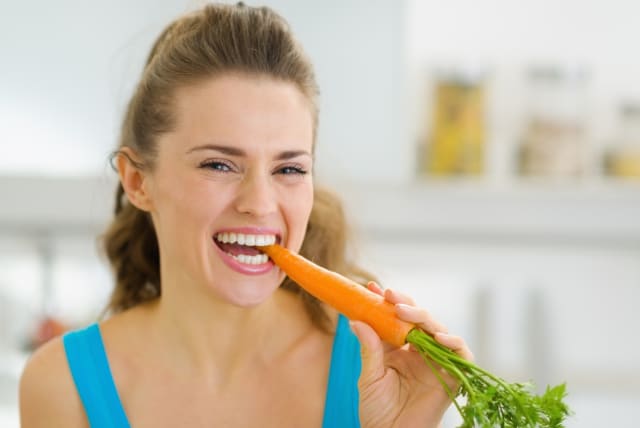The dark side of TikTok's carrot tan trend: Is it worth the risk?

Numerous TikTok influencers have adopted an extreme carrot-eating habit, asserting that it imparts a natural tan. Find out what experts have to say:
A fad advocating carrot consumption might appear worth embracing, yet experts contend that overindulging in carrots to attain a sun-kissed complexion is misleading and possibly problematic.
Numerous TikTok influencers have adopted a carrot-eating habit, asserting that it imparts a natural tan. However, this beauty regimen doesn't yield a bronzed hue but rather intensifies freckles. In multiple TikTok clips, carrots are heralded as a miraculous remedy for a swift tan, sidestepping sun exposure or tanning beds.
One beauty influencer, boasting half a million TikTok followers, advocates consuming three large carrots daily, asserting that it can alter the undertone of a person's skin's. Another influencer alleges that her addiction to carrots eradicated her pale complexion, while yet another imparts a homemade carrot juice recipe for fast and effective tanning solution.
@isabelle.lux #stitch with @Hannah just est your carrots #carrottan #naturaltanning #tanninghacks ♬ original sound - Isabelle ⚡️ Lux
Experts assert that while the technique isn't typically dangerous, it remains ineffective in producing a tan. Instead, the orange skin hue results from carotenemia, a condition in which elevated beta-carotene pigment levels, abundant in vegetables like carrots, impart a yellow tint to the skin.
Dr. Duane Mellor, a nutritionist at Easton University, underscores that carotenemia linked to diet is usually harmless, but that excessive consumption may induce nutritional imbalances, neglecting other vital foods.
Carrot craze: Proceed with caution
However, this coveted orange glow could also mask serious health issues such as jaundice, a color-altering skin condition that requires immediate medical attention. The increased beta-carotene could also cause vitamin A deficiencies in the consumer, which can only be corrected through increased consumption of specific foods such as eggs and cheese.
Experts emphasize that sun protection relies on clothing, sunscreen, shades, and shade. Dr. Emma Wadgworth, a dermatologist, clarifies that while carrot beta-carotene is an antioxidant, it inadequately shields against UV exposure, potentially leading to burns and skin damage.
TikTok influencer Isabelle (@isabelle), who is less informed than experts, amassed over five million views through videos touting the merits of carrots. In one such video, she contrasts her youthful appearance without a "natural tan" to her present glow which she attributes to years of carrot consumption.
In another video, she advocates for people to forgo fake tan and sun exposure, and to instead consume "three large carrots" a day, something that she says she has done for several years now.
A fellow influencer, @adixovic, claims dietary carrots transformed him from pale to tan and toned, sans sunlight or products. The video contends that orange vegetable beta-carotene is "acne-friendly" and "sun-defensive."
Another TikToker, @izaszyszko, presents a carrot juice recipe promising the coveted orange tint. Combining carrot, pepper, ginger, turmeric, and lemons, her video garnered over eight million views, with commenters attesting to carrots' efficacy in enhancing tans and sun protection.
Despite the carrot craze taking the internet by storm, Dr. Lahvit Akerman cautions against overconsumption due to potential links to lung and prostate cancers and strokes. Experts recommend a daily beta-carotene intake of 2-7 mg, avoiding accumulation.@adixovic You cant replace tanning from the sun but this is a healthy alternative to use all year around and without the need of unhealthy tanning salons feel free to ask #selfimprovement #carrots #skincolor #tanning #naturaltan #fypシ #fypage #fypシ゚viral #viral #trending ♬ Memory Reboot - VØJ & Narvent
Jerusalem Post Store
`; document.getElementById("linkPremium").innerHTML = cont; var divWithLink = document.getElementById("premium-link"); if (divWithLink !== null && divWithLink !== 'undefined') { divWithLink.style.border = "solid 1px #cb0f3e"; divWithLink.style.textAlign = "center"; divWithLink.style.marginBottom = "15px"; divWithLink.style.marginTop = "15px"; divWithLink.style.width = "100%"; divWithLink.style.backgroundColor = "#122952"; divWithLink.style.color = "#ffffff"; divWithLink.style.lineHeight = "1.5"; } } (function (v, i) { });

